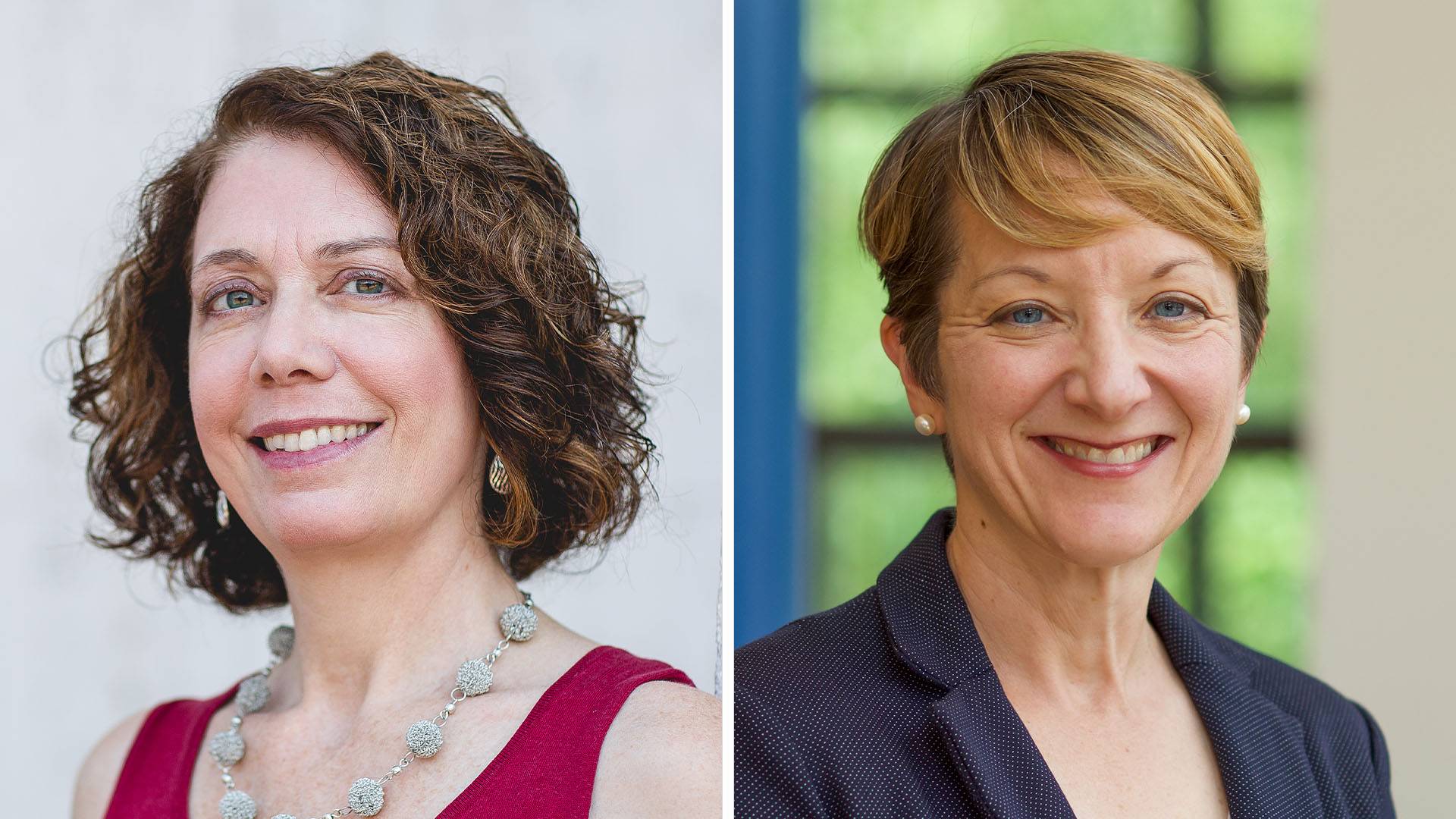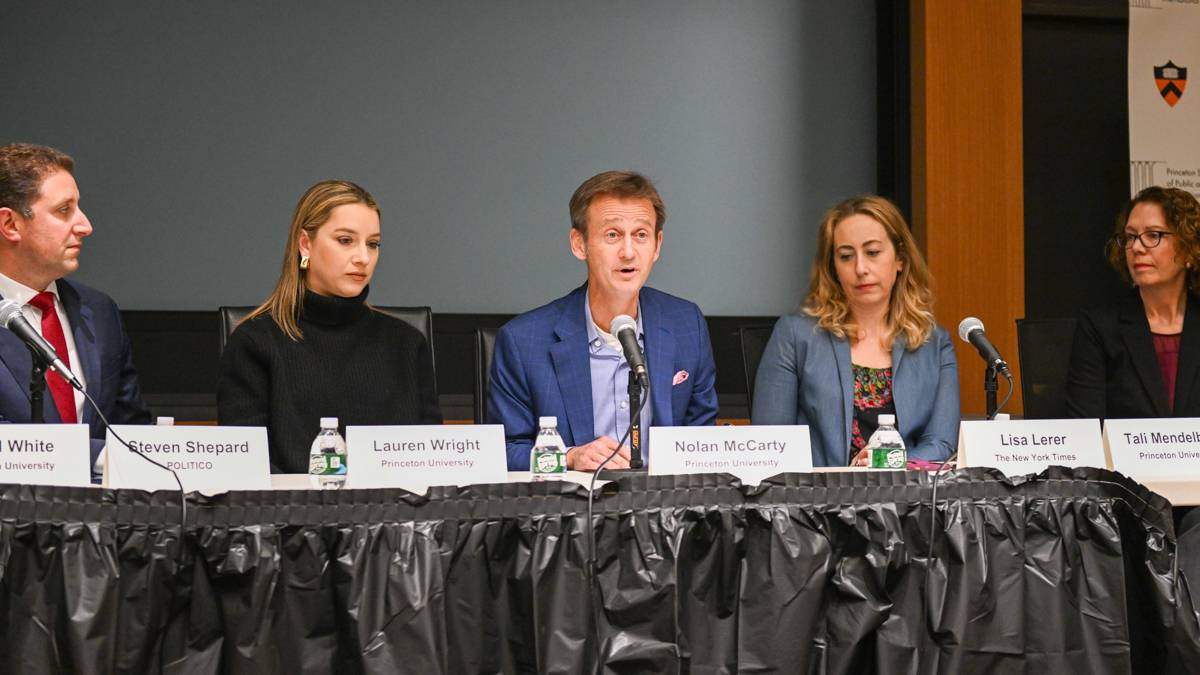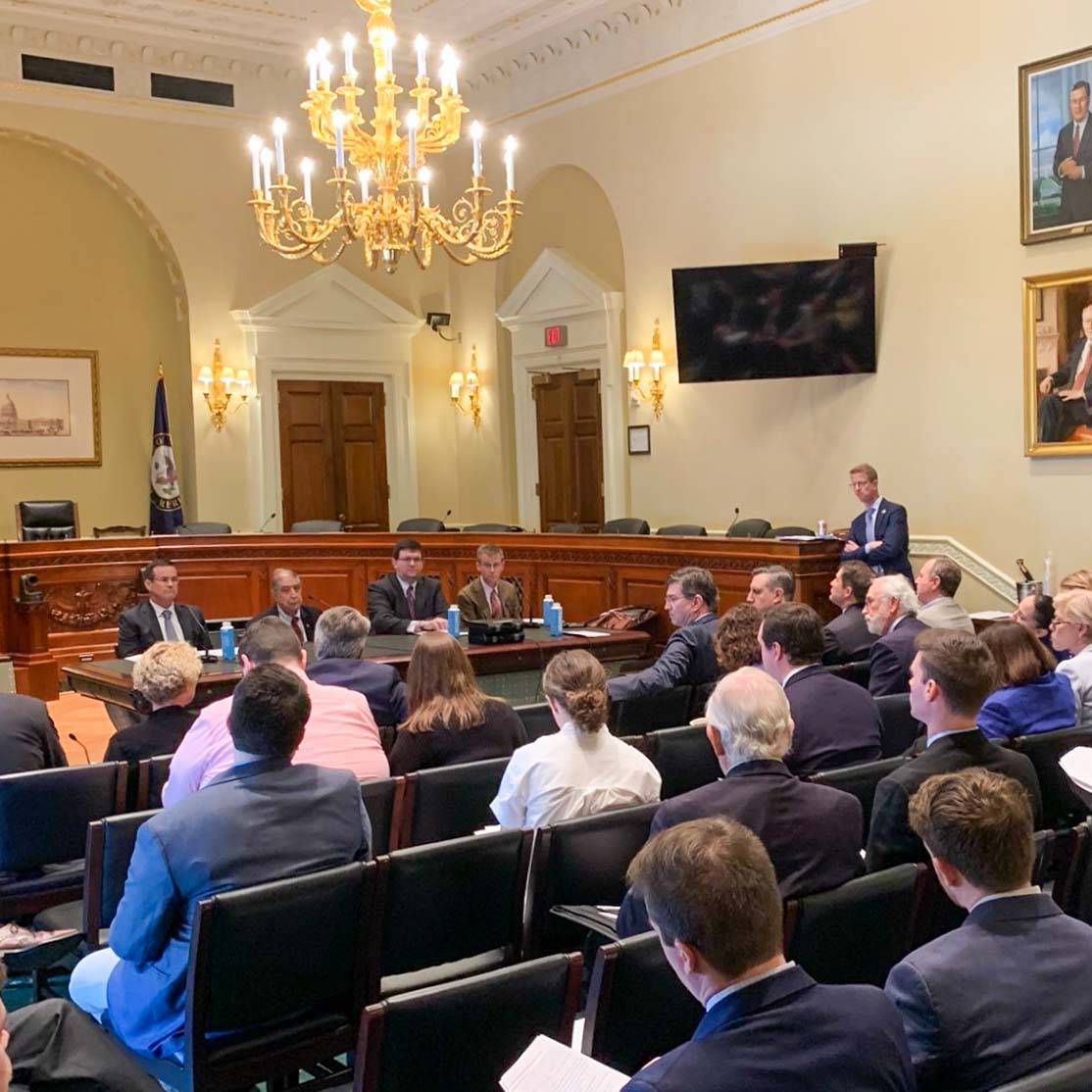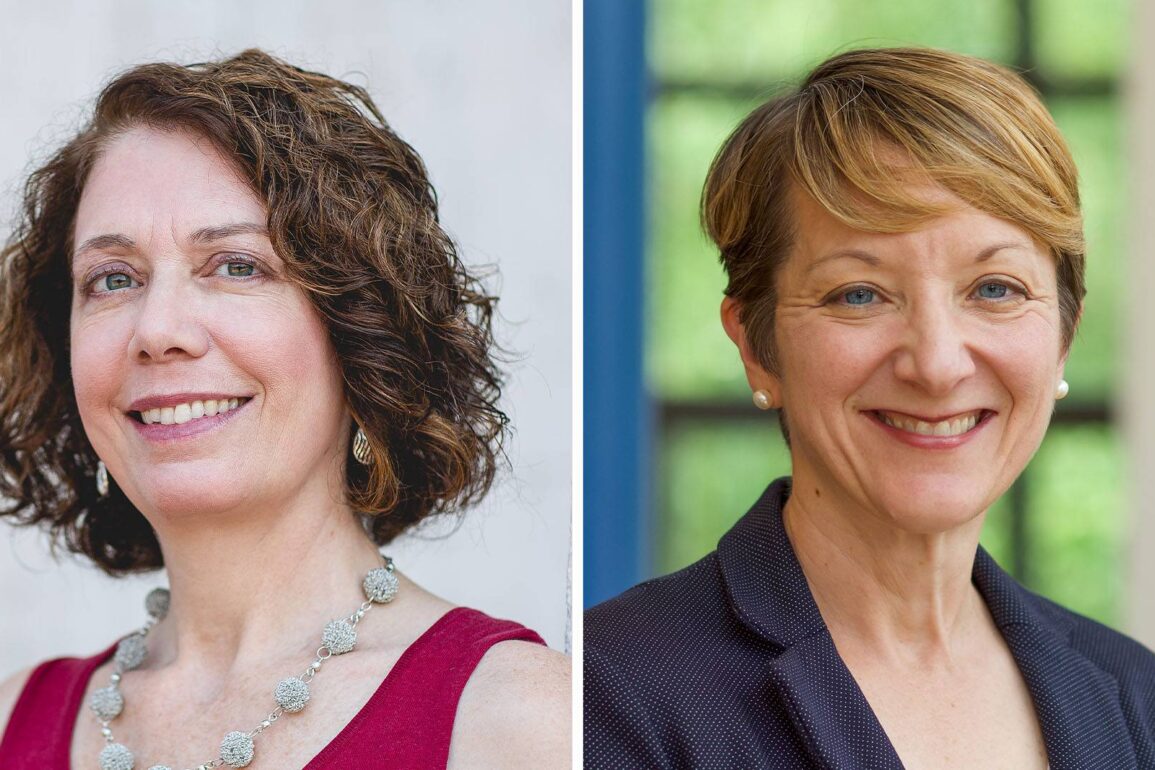As America has reflected in recent years on the strength of our democracy in an era of hyperpartisanship, a former deputy chief of staff to Donald Trump and a former chief of staff to Nancy Pelosi have both visited Princeton’s campus at the invitation of the University’s Center for the Study of Democratic Politics (CSDP) to share their insights and aspirations for government as it’s practiced in the nation’s halls of powers.
Inviting such ideologically diverse perspectives is one of the hallmarks of the influential center, where scholars and practitioners from across the political spectrum find common ground in their shared commitment to strengthening democratic ideals and institutions. Faculty affiliated with CSDP conduct rigorous social science research on the issues of our day.
“At a time when democratic institutions around the world find themselves on shaky ground, the Center for the Study of Democratic Politics, with its exceptional faculty, provides vital training to future scholars and policymakers on how to protect and strengthen them,” said Amaney Jamal, dean of the Princeton School of Public and International Affairs (SPIA). “In addition, by welcoming speakers and perspectives from across the political spectrum, CSDP regularly shows us what constructive dialogue looks like on a university campus.”
On Oct. 23, the center hosted three polling experts from across the aisle for a pre-election panel to share insights on voter concerns, political strategies and the electoral landscape going into the Nov. 5 presidential election.
“Decoding the Vote: Data-Driven Insights for the 2024 Election” featured Christina Coloroso, executive director of the progressive campaign consulting company Analyst Institute; alumnus Joe Lenski ’87, co-founder and executive vice president of the exit polling firm Edison Research; and Chris Wilson, CEO of WPA Intelligence, which has consulted for candidates including Texas Sen. Ted Cruz and Virginia Gov. Glenn Youngkin.
Following the election, CSDP will host panels on Nov. 20 and Dec. 2 to look back and assess.
A ‘bedrock commitment to democracy’

Tali Mendelberg (left) and Frances Lee are co-directors of Princeton’s Center for the Study of Democratic Politics (CSDP), dedicated to examining and strengthening democratic institutions and ideals.
CSDP is a research program within Princeton SPIA established in 1999 by Larry Bartels, the Donald E. Stokes Professor in Public and International Affairs, emeritus. Today, the center is co-directed by Tali Mendelberg, the John Work Garrett Professor of Politics, and Frances Lee, a professor of politics and public affairs.
CSDP brings experts and government officials into dialogue with Princeton social scientists and students who embrace this “bedrock commitment to democracy,” Mendelberg said, encouraging discussion that upholds norms of pluralism, tolerance and respect. Mendelberg will moderate the Oct. 23 polling conversation.
Through its academic-based programs, CSDP provides people of opposing views with a platform for expression, like the events with Chris Liddell from the Trump administration and John Lawrence from former House Speaker Pelosi’s office, who visited separately within 18 months of each other.
CSDP’s post-election event on Nov. 20, moderated by Lee, will feature political analyst Amy Walter, the publisher and editor-in-chief of The Cook Political Report. The Dec. 2 panel will bring in a range of campaign consultants, election analysts and scholars.
The intent is to consider “how political actors from different perspectives approach problems,” Lee said. “The goal is to help illuminate the issues, to help people understand the political world better.“
Leaders in social science research and political problem-solving
CSDP also studies key issues to inform the public’s understanding of how our political systems function, to propose solutions, and to promote democratic practices. “The center’s focus is on using neutral social science research and educational programming to produce knowledge about the political world, its problems, and how people perceive them,” Mendelberg said.
In their scholarly work, Princeton faculty researchers affiliated with CSDP examine and address the most pressing issues facing American democracy, including political polarization, misinformation, and unequal power dynamics in modern politics. Among them:
Nolan McCarty, the Susan Dod Brown Professor of Politics and Public Affairs, is a widely cited expert on political polarization, particularly in the nation’s legislature. The now-entrenched partisan divide poses significant consequences for governance, McCarty said, because of its ability to “undermine the role of Congress in fulfilling its constitutional duties.”
McCarty also co-chairs the Task Force on the Power of the Purse, a subcommittee of the Princeton Initiative on Restoring the Constitutional Powers of Congress at CSDP, an ongoing collaboration between scholars and former Congressmembers led by former U.S. Rep. Mickey Edwards. McCarty will present the task force’s recommendations for transparency, accountability, and congressional review of executive spending in a report to Capitol Hill audiences after the election.

CSDP hosts panel discussions and other events that bring together guest speakers and Princeton faculty. This one, from December 2022, focused on the aftermath of the 2022 midterm elections.
Hye Young You, an associate professor of politics and public affairs, explores the impact of interest groups and lobbying on democratic representation. In January, she will publish “Hearings on the Hill: The Politics of Informing Congress” (Cambridge University Press) with Pamela Ban of the University of California-San Diego and Ju Yeon Park of Ohio State University, analyzing “how partisan incentives determine how and from whom members of Congress seek information.”
Andy Guess is an associate professor of politics and public affairs who studies social media and misinformation. While “blatant” misinformation comprises only a small part of the average person’s information diet, he said, he is actively monitoring how social media platforms appear to be taking election-related misinformation threats “less seriously” than in 2020.
Markus Prior, a professor of politics and public affairs who previously served as CSDP’s director, studies how ordinary people engage politically. One of his current avenues of inquiry is whether voter impatience on long-term issues like climate change — “wanting to push the difficult decisions or the costs into the future“ — is a trait shared by people across the political spectrum.
Paul Starr, the Stuart Professor of Communications and Public Affairs and a professor of sociology and public affairs, has written about the entrenchment of power, race and identity, and the widening gender disparity between voters. This fall, Starr is finishing a book, “The American Contradiction,” on the deepening divides in American society and politics since the mid-20th century.
CSDP has increasingly sought to bring scholarly insight to the public conversation about our democracy, an effort exemplified by Julian Zelizer, the Malcolm Stevenson Forbes, Class of 1941 Professor of History and Public Affairs at Princeton, who writes widely as a commentator and appears regularly on national broadcasts.
A noteworthy strength in race and politics
Notably, according to Mendelberg, CSDP has “possibly the strongest group of scholars of race and politics in the country.”
They include Ismail White, professor of politics and public affairs, “arguably the leading scholar of Black politics in the U.S.,” Mendelberg says; Paul Frymer, professor of politics, who researches issues of labor, race and historical policy; associate professor of politics and public affairs Jonathan Mummolo, known for his pathbreaking research on racial disparities in policing; and associate professor of politics LaFleur Stephens-Dougan, author of the award-winning “Race to the Bottom: How Racial Appeals Work in American Politics” (University of Chicago Press, 2020).
Through a grant from the Princeton Alliance for Collaborative Research and Innovation (PACRI), Stephens-Dougan and co-principal investigator Byron D’Andra Orey of Jackson State University are collecting data in a national study of Black voters both before and after the Nov. 5 election. “We’re really excited about the opportunity to really dig deep into this population,” she said, “especially given how pivotal they’re likely to be in terms of this upcoming election.”
CSDP also continues a distinguished tradition of research on the courts, Mendelberg said. Charles Cameron, a professor of politics and public affairs, and John Kastellec, a professor of politics, documented close to a century of Supreme Court appointments in the acclaimed book, “Making the Supreme Court: The Politics of Appointments, 1930-2020” (Oxford University Press, 2023). “They show how SCOTUS became the polarized institution it is today,“ Mendelberg said.
Capitol connections
In addition to amplifying faculty‘s independent research, the center also promotes connections between Princeton and Washington, D.C., giving SPIA graduate students and postdoctoral fellows the option to engage in more intimate conversations with visiting speakers over coffee or dinner after the public events.

Former U.S. Rep. Mickey Edwards (second from left at table) presents to Congress as part of the Princeton Initiative on Restoring the Constitutional Powers of Congress. Professor Nolan McCarty (far right at table) co-chairs the initiative’s Task Force on the Power of the Purse. U.S. Rep. Derek Kilmer (standing at right) is an alumnus from the Class of 1996.
Rob Oldham, a Ph.D. student in politics, said he found a talk with U.S. Rep. Derek Kilmer ‘96 to be particularly insightful. Kilmer, an advocate for congressional reform, discussed his efforts to improve the institution as chair of the bipartisan House Select Committee on the Modernization of Congress. Pelosi deputy Lawrence offered a keenly nuanced view of policymaking during the economic crisis of 2008, Oldham said.
Oldham has received funding from CSDP to research congressional policymaking in times of crisis. He will be on Capitol Hill this November as part of the American Political Science Association Congressional Fellowship Program.
“CSDP empowered me to do this,” he said. “I’m very lucky to have had the access and the ability to explore what I wanted to.”



